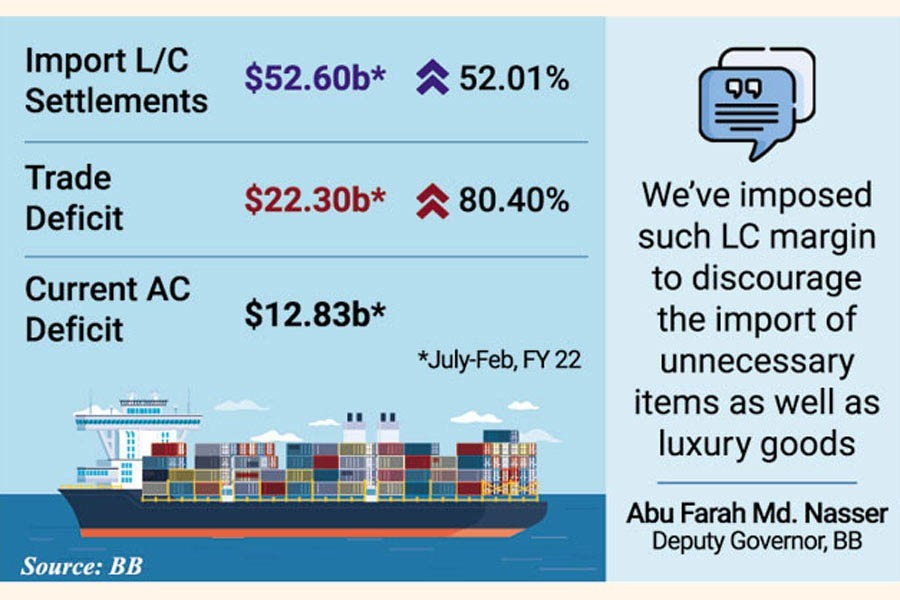Depositing minimum 25-percent cash margin on letter of credit (LC) for all imports, bar some essentials, is now mandatory under a monetary measure meant for easing import-payment pressure on the economy.
Officials and economists said the central bank imposed the higher cash-margin ceiling to discourage non-essential imports as a thrift measure in the wake of volatility on the foreign-currency market.
The products exempted from the LC-margin-restriction inventory are baby food, essential food items including energy, lifesaving drugs, local and export-oriented industries and agriculture-related imports, according to a notification issued Monday by the Bangladesh Bank (BB).
These essential items are allowed to be imported under banker-customer bonhomie outside the LC restrictions, according to the officials.
Actually, the central bank imposed such LC margin after nearly two decades to manage money and credit programmes efficiently in view of the global market tantrums.
Back on December 02, 2003, the central bank withdrew such restrictions asking all the scheduled banks to determine the rate of LC margins for all kinds of imports on the basis of banker-customer relationship.
"We've imposed such LC margin to discourage the import of unnecessary items as well as luxurious goods," Abu Farah Md. Nasser, deputy governor of the BB, told the FE while explaining the main objective of the monetary thrift measure.
The deputy governor also said it a temporary measure that will also help keep the country's foreign-exchange market stable.
Cash margins are the amount of money an importer has to deposit with its bank for initiating an import transaction, such as opening an LC.
Talking to the FE, Mustafa K Mujeri, executive director of the Institute for Inclusive Finance and Development (InM), said the central bank should monitor closely the inflationary pressure on the economy following imposition of LC margin on imports.
The senior economist also feels that the government should take effective measure to boost domestic production of essential items.
"There is scope to enhance production of essential items," Mr Mujeri, also a former chief economist of the BB, said while explaining on a query.
Senior bankers welcome the latest belt-tightening move, saying that it will help decrease the pressure on the country's foreign-exchange market through discouraging unnecessary imports.
"This is a rational move, taken by the central bank," Syed Mahbubur Rahman, managing director and chief executive officer of Mutual Trust Bank Limited, told the FE while expressing his reaction on the notification. The senior banker also holds the hope that it would also help improve the current-account situation of Bangladesh.
The latest regulatory move comes against the backdrop of rising trend in the current-account deficit alongside depreciating mode of the local currency against the US dollar in recent months mainly due to higher import-payment obligations.
The exchange rate of Bangladesh Taka (BDT) has so far depreciated by Tk1.39 against the US dollar since July 2021 following higher demand for the greenback for settling import-payment obligations.
The dollar was quoted at Tk 86.20 each on the inter-bank market on Monday, unchanged from the previous level. It was Tk 84. 81 in July last calendar year.
Meanwhile, the settlement of letters of credit (LC), generally known as actual import, in terms of value, jumped by 52.01 per cent to $52.60 billion during the July-February period of the current fiscal (FY), 2021-22, from $34.61 billion in the same period of the previous FY, according to the central bank's latest statistics.
The opening of LCs, generally known as import orders, also grew by more than 49 per cent to $59.45 billion during the period under review from $39.87 billion in the same period of FY '21.
On the other hand, the country's current-account balance deteriorated further, hitting an 'all-time high' at $12.83 billion, following higher import payments alongside lower flow of inward remittances during the period under review.
The current-account deficit rose to $12.83 billion during the July-February period of FY'22 from $10.19billion a month ago. It was $825 million surplus in same period of FY'21.


